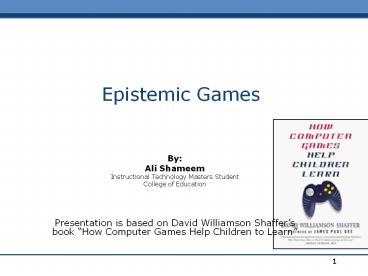Epistemic Games - PowerPoint PPT Presentation
Title:
Epistemic Games
Description:
Our kids and our economy will be left behind. 4. Epistemic Games. They are a way to help students learn to think like professionals. ... – PowerPoint PPT presentation
Number of Views:106
Avg rating:3.0/5.0
Title: Epistemic Games
1
Epistemic Games
- By
- Ali Shameem
- Instructional Technology Masters Student
- College of Education
- Presentation is based on David Williamson
Shaffers book How Computer Games Help Children
to Learn
2
Overview
- Problem in our education system
- Epistemic Games
- Elements of Epistemic frames
- Epistemic frames
- Is it really a Game?
- Example of Epistemic Games Digital Zoo
- Example of Epistemic Games Urban Science
- Building Epistemic games Epistemography
- More Information about games and Learning
3
Problem in our education system
- Currently our Education is about
- giving the learner basic skills
- Preparing students to score well in standardized
tests. - Basic skills jobs no longer exist
- We should raise the bar on educational
achievement - Our kids and our economy will be left behind
4
Epistemic Games
- They are a way to help students learn to think
like professionals. - they are based on what we already know about how
people learn to be innovative thinkers - how thinking is used to solve real problems in
the world outside of the game - This concept is based on the idea of epistemic
frames
5
Epistemic Frames
- New way of thinking about thinking
- the way of thinking and working of a profession
or other community of practice - entails a situated and action-based form of
learning based on the ways in which professionals
develop these epistemic frames.
6
Elements of Epistemic frame
- 5 elements of Epistemic frame are
- Epistemology
- knowledge,
- skills,
- values
- identity.
- professionals organize their work around these
epistemic frames - professionals use them to think in innovative
ways
7
Is it really a Game?
- The definition of a game from Rules of Play Game
Design Fundamentals book - A game is a system
- In which players
- engaged in an artificial conflict
- defined by rules
- That results in a quantifiable outcome
8
Is it really a Game?
- Epistemic games are role playing games
- It is system
- A number of players involved in game play
- Engaged in an accurate simulation of real-life
problem. - overcome obstacle to achieve the goal
- Defined by rules same as the ones in real life
- May or may not have a quantifiable outcome
- The experience is considered more important
- Learning through experience/interactions of game
play
9
Examples of Epistemic Games Digital Zoo
- A game developed at the University of Wisconsin
- Players become biomechanical engineers and design
virtual creatures. - Uses Sodaconstructor
- a virtual spring-mass modeling environment
- Players advance from one level of the game by
producing designs for clients.
10
Example of Epistemic Games Urban Science
- Very similar to commercial game SimCity
- Why not use SimCity?
- SimCity is not an epistemic game.
- Role-playing game of professional urban planning.
- designed to re-create an urban planning
practicum. - iPlan is the epistemic game engine used in Urban
Science
11
Building Epistemic games Epistemography
- Build based on the way professionals develop
skills Practica - By analyzing practicum through epistemography
- By looking at the kind of actions and kind of
reflection-on-action that develops the epistemic
frame of the profession. - How can we make these learning practices
available for other through games.
12
Questions
- The following questions are asked when designing
an epistemic game. - What is worth being able to do in the world?
- Who knows how to do this kind of things and how
do they learn how to do it? - How can we make these learning practices
available for the others? - Technology that can create simulations.
13
More Information about games and Learning
- Details on all of these games are available at
Shaffer's Web site, Epistemic Games
(www.epistemicgames.org).
14
Questions ??
- Thank you































